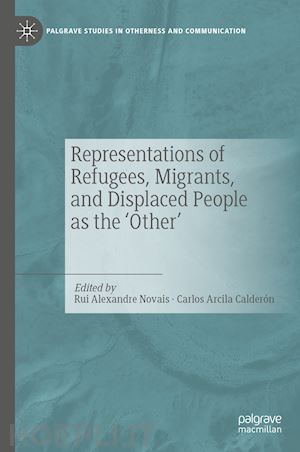
Questo prodotto usufruisce delle SPEDIZIONI GRATIS
selezionando l'opzione Corriere Veloce in fase di ordine.
Pagabile anche con Carta della cultura giovani e del merito, 18App Bonus Cultura e Carta del Docente
This book explores how 21st-century media-based discourses on migrants, refugees, and displaced people both reinforce and reconfigure existing negative stereotypes about these groups as 'other.' It is particularly pertinent considering the increasingly polarized world context and the evolving communication ecosystem with new media as privileged platforms for exclusionary narratives toward the ‘outgroups’ of migrants, refugees, and displaced people. The book's contributions encompass various methodologies and disciplines within communication studies, including qualitative analyses of media representations and quantitative research on public opinion. Unlike much of the existing English-language scholarship on these marginalized communities, this book de-centers North America and the UK to offer a global perspective focusing on regions such as continental and eastern Europe, the Middle East and Persian Gulf, India, China, Turkey, Russia, and Scandinavia.
Part I: The othering of refugees in the news media.- Chapter 1: The representation of Afghan and Ukrainian refugees in the leading Spanish newspapers.- Chapter 2: The time of the outside: Analyzing the Representation of Migrant and Refugee Individuals in Local Newspapers.- Chapter 3: Hooded men versus Veiled women: The role of clothing in othering refugees.- Chapter 4: Navigating Everyday Otherness: Understanding Host Community Perceptions of Different Refugee Groups with Shared Cultural Elements.-Part II– The othering of refugees in other media.- Chapter 5: Unequal Framing During Two Crises? How Politicians Framed Immigrants During the 2015-2016 Refugees Crisis and Following the Russian Aggression Against Ukraine.- Chapter 6: A Breakdown of the Visegrad Group Countries Coverage of the Syrian Refugee Crisis and the Ukrainian Refugee Crisis.- Chapter 7: Visualising refugees: Exploring potential double standards in Refugee Policies in Australia and Canada.- Chapter 8: Representation of Refugees as “Others” in Turkish Cinema.- Part III - Representations of migrants and displaced people as the ‘Other’.- Chapter 9: Sticky, valuable,contested. The reputation of migrants and their groups, Davide Donatiello.- Chapter 10: Diaspora and Ethnic Humour. The reception of a video about the Portuguese of France on Youtube.- Chapter 11: Vlog Walks: Reengaging with the collective memory of the Indian-Chinese Community.- Chapter 12: Discourses of Othering in COVID-19 Infodemic: Situational Analysis of the Online Media Content in Serbia.- Chapter 13: Construction of Othering in the Press: A Cross-Analysis of the Representation of Migrant Languages and Accents in the Twenty-First Century.- Part IV: Beyond stereotypical or schematic othering.- Chapter 14: Beyond Victimhood: Recognizing Refugees as Active Contributors to Society.- Chapter 15: Turning voices into alarms: rescuing forced migrants in the Mediterranean through alternative narratives as a form of political action.- Chapter 16: Female migrant as Other.- Chapter 17: A-verse to Displacement: a poetic witness.- Chapter 18: Reflections on journalistic role perceptions in Belgium and Sweden: strategies and difficulties while reporting on refugees.
Rui Alexandre Novais is Professor and Researcher at the Centre for Philosophical and Humanistic Studies (CEFH) of the Universidade Católica Portuguesa (Portugal).
Carlos Arcila Calderón is an Associate Professor and member of the Observatory of Audiovisual Contents (OCA) of the University of Salamanca (Spain).











Il sito utilizza cookie ed altri strumenti di tracciamento che raccolgono informazioni dal dispositivo dell’utente. Oltre ai cookie tecnici ed analitici aggregati, strettamente necessari per il funzionamento di questo sito web, previo consenso dell’utente possono essere installati cookie di profilazione e marketing e cookie dei social media. Cliccando su “Accetto tutti i cookie” saranno attivate tutte le categorie di cookie. Per accettare solo deterninate categorie di cookie, cliccare invece su “Impostazioni cookie”. Chiudendo il banner o continuando a navigare saranno installati solo cookie tecnici. Per maggiori dettagli, consultare la Cookie Policy.